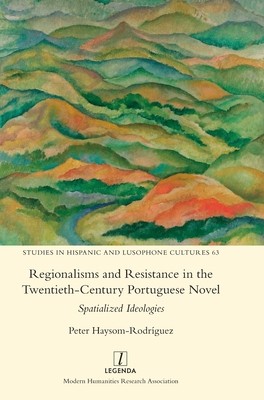
- We will send in 10–14 business days.
- Author: Peter Haysom-RodrÃÂguez
- Publisher: Legenda
- ISBN-10: 1839543132
- ISBN-13: 9781839543135
- Format: 17 x 24.4 x 1.3 cm, kieti viršeliai
- Language: English
- SAVE -10% with code: EXTRA
Regionalisms and Resistance in the Twentieth-Century Portuguese Novel (e-book) (used book) | bookbook.eu
Reviews
Description
Often regarded as a small and homogeneous country, modern Portugal has frequently displayed clear regional tensions, on several 'axes': between its capital, Lisbon, and more neglected cities and towns; between its developed coastline and its (noticeably declining) inland villages; between the relatively conservative small-holding communities of the North and the politically radical tenant farmers of the South, amongst others. Examining twentieth-century novelists' treatment of such geographical precepts leads one to ponder: what relationships exist between ideology and (regional) spaces? Through analysis of narrative fiction, how can one better comprehend the complex geographical grievances and identity politics that are increasingly characterising ideo-logical discourses across Western nations? The novels of Aquilino Ribeiro (1885-1963), Agustina Bessa-LuÃÂs (1922-2019), LÃÂdia Jorge (1946-) and José Saramago (1922-2010) all have their part to play, in this quest for greater understanding of Portuguese regionalisms and resistances.
Peter Haysom-RodrÃÂguez is a Lecturer in Modern Languages at the University of Leeds. He holds a Ph.D. in Portuguese & Lusophone Studies from the University of Nottingham.
EXTRA 10 % discount with code: EXTRA
The promotion ends in 23d.22:21:14
The discount code is valid when purchasing from 10 €. Discounts do not stack.
- Author: Peter Haysom-RodrÃÂguez
- Publisher: Legenda
- ISBN-10: 1839543132
- ISBN-13: 9781839543135
- Format: 17 x 24.4 x 1.3 cm, kieti viršeliai
- Language: English English
Often regarded as a small and homogeneous country, modern Portugal has frequently displayed clear regional tensions, on several 'axes': between its capital, Lisbon, and more neglected cities and towns; between its developed coastline and its (noticeably declining) inland villages; between the relatively conservative small-holding communities of the North and the politically radical tenant farmers of the South, amongst others. Examining twentieth-century novelists' treatment of such geographical precepts leads one to ponder: what relationships exist between ideology and (regional) spaces? Through analysis of narrative fiction, how can one better comprehend the complex geographical grievances and identity politics that are increasingly characterising ideo-logical discourses across Western nations? The novels of Aquilino Ribeiro (1885-1963), Agustina Bessa-LuÃÂs (1922-2019), LÃÂdia Jorge (1946-) and José Saramago (1922-2010) all have their part to play, in this quest for greater understanding of Portuguese regionalisms and resistances.
Peter Haysom-RodrÃÂguez is a Lecturer in Modern Languages at the University of Leeds. He holds a Ph.D. in Portuguese & Lusophone Studies from the University of Nottingham.


Reviews